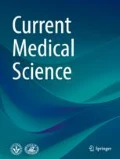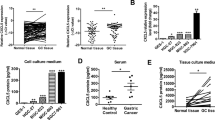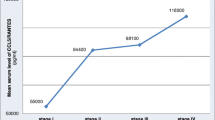Summary
This study examined the role of regulated upon activation normal T cell expressed and secreted (RANTES) and its receptor C-C chemokine receptor type 5 (CCR5) in gastric cancer metastasis and the associated mechanism. The expression of RANTES and CCR5 was detected by using immunohistochemical staining and Western blotting in the gastric cancer tissues obtained from 60 gastric cancer patients with or without lymph node metastasis (n=30 in each). The results showed that the expression levels of RANTES and CCR5 were higher in gastric cancer with lymph node metastasis than in that without metastasis (P<0.05). The expression levels of RANTES in 30 lymph nodes with cancerous invasion were higher than in 30 normal lymph nodes (P<0.05). Chemotactic test revealed that the number of migrating gastric cancer cells (n=295.0±54.6) induced by the protein of cancer-invading lymph nodes was greater than that by the protein mixture from cancer-invading lymph nodes and RANTES antibody (n=42.5±11.6) (P<0.05). RT-PCR showed that the expression levels of the main Th1 cytokines (IL-2, Γ-IFN) were lower in gastric cancer with lymph node metastasis (2.22±0.90, 3.26±1.15 respectively) than in that without metastasis (3.07±1.67, 4.77±1.52 respectively) (P<0.05), but the expression level of the main Th 2 cytokine (IL-10) was higher in gastric cancer with lymph nodes metastasis (6.06±2.04) than in that without metastasis (4.88±1.87) (P<0.05). It was concluded that RANTES and its receptor CCR5 may contribute to gastric cancer metastasis through influencing the balance of Th1/Th2. RANTES and CCR5 may become a marker of gastric cancer metastasis.
Similar content being viewed by others
References
Huang ZH, Hua D, Du X, et al. ERCC1 polymorphism, expression and clinical outcome of oxaliplatin-based adjuvant chemotherapy in gastric cancer. World J Gastroenterol, 2008,14(41):6401–6407
Henson DE, Dittus C, Younes M, et al. Differential trends in the intestinal and diffuse types of gastric carcinoma in the United States-2000: increase in the signet ring cell type. Arch Pathol Lab Med, 2004,128(7): 765–770
Hirao M, Onai N, Hiroishi K, et al. CC chemokine receptor 27 on dendritic cells induced after interaction with apoptotic tumor cells: critical role in migration from the tumor site to draining lymph nodes. Cancer Res, 2000,60(8):2209–2217
Gerard C, Rollins BJ. Chemokines and disease. Nat Immunol, 2001,2(2):108–115
Ben-Baruch A. The multifaceted roles of chemokines in malignancy. Cancer Metastasis Rev, 2006,25(3):357–371
Zlotnik A. Involvement of chemokine receptors in organ specific metastasis. Contrib Microbiol, 2006,13(1):191–199
Ben-Baruch A. Organ selectivity in metastasis: regulation by chemokines and their receptors. Clin Exp Metastasis, 2008,25(4):345–356.
Murphy PM, Baggiolini M, Charo IF, et al. International union of pharmacology. XXII. Nomenclature for chemokine receptors. Pharmacol Rev, 2000,52(1):145–176
Luboshits G, Shina S, Kaplan O, et al. Elevated expression of the CC chemokine regulated on activation, normal T cell expressed and secreted (RANTES) in advanced breast carcinoma. Cancer Res, 1999,59(18):4681–4687
Yaal-Hahoshen N, Shina S, Leider-Trejo L, et al. The chemokine CCL5 as a potential prognostic factor predicting disease progression in stage II breast cancer patients. Clin Cancer Res, 2006,12(15):4474–4480
Zhang P, Li H, Wu ML, et al. c-Myc downregulation: a critical molecular event in resveratrolinduced cell cycle arrest and apoptosis of human medulloblastoma cells. J Neurooncol, 2006,80(2):123–131
Johnson Z, Kosco-Vilbois MH, Herren S, et al. Interference with heparine blinding and obliogomerization creates a novel anti-inflammatory strategy targeting the chemokine system. J Immunol, 2004,173(9):5776–5785
Soria G, Yaal-Hahoshen N, Azenshtein E, et al. Concomitant expression of the chemokines RANTES and MCP-1 in human breast cancer: a basis for tumor-promoting interactions. Cytokine, 2008,44(1):191–200
Soria G, Ben-Baruch A. The inflammatory chemokines CCL2 and CCL5 in breast cancer. Cancer Lett, 2008,267(2):271–285
Müller A, Homey B, Soto H, et al. Involvement of chemokine receptor in breast cancer metastasis. Nature, 2001,410(6824):50–56
Aldinucci D, Lorenzon D, Cattaruzza L, et al. Expression of CCR5 receptors on Reed-Sternberg cells and Hodgkin lymphoma cell lines: involvement of CCL5/Rantes in tumor cell growth and microenvironmental interactions. Int J Cancer, 2008,122(4):769–776
Eissa SA, Zaki SA, El-Maghraby SM et al. Important of serum IL-18 and RANTES as markers for breast carcinoma progression. J Egypt Natl Canc Inst, 2005,17(1): 51–55
Strieter RM, Burdick MD, Mestas J, et al. Cancer CXC chemokine networks and tumour angiogenesis. Eur J Cancer, 2006,42(6):768–778
Karnoub AE, Dash AB, Vo AP, et al. Mesenchymal stem cells within tumour stroma promote breast cancer metastasis. Nature, 2007,449(7162):557–563
Vaday GG, Peehl DM, Kadam PA, et al. Expression of CCL5 (RANTES) and CCR5 in prestate cancer. Prostate, 2006,66(2):124–134
Borczuk AC, Papanikolaou N, Toonkel RL, et al. Lung adenocarcinoma invasion in TGF beta RII-deficient cells is mediated by CCL5/RANTES. Oncogene, 2008,27(4): 557–564
Kim HK, Song KS, Park YS, et al. Elevated levels of circulating platelet microparticles, VEGF, IL-6 and RANTES in patients with gastric cancer: possible role of a metastasis predictor. Eur J Cancer, 2003,39(2):184–191
Sutton A, Friand V, Papy-Garcia D, et al. Glycosaminoglycans and their synthetic mimetics inhibit RANTES-induced migration and invasion of human hepatoma cells. Mol Cancer Ther, 2007,6(11):2948–2958
Robinson SC, Scott KA, Wilson JL, et al. A chemokine receptor antagonist inhibits experimental breast tumor growth. Cancer Res, 2003,63(23):8360–8365
Vitiello PF, Shainheit MG, Allison EM, et al. Impact of tumor-derived CCL2 on T cell effector function. Immunol Lett, 2004,91(2–3):239–245
Adler EP, Lemken CA, Katchen NS, et al. A dual role for tumor-derived chemokine RANTES (CCL5). Immunol Lett, 2003,90(2–3):187–194
Della Bella S, Molteni M, Compasso S, et al. Differential effects of cyclooxygenase pathway metabolites on cytokine production by T lymphocytes. Prostaglandins Leukot Essent Fatty Acids, 1997,56(3):177–84
Huang M, Stolina M, Sharma S, et al. Non-small cell lung cancer cyclooxygenase-2-dependent regulation of cytokine balance in lymphocytes and macrophages: up-regulation of interleukin 10 and down-regulation of interleukin12 production. Cancer Res, 1998,58(6):1208–1216
Author information
Authors and Affiliations
Corresponding author
Additional information
These authors contributed equally to this work.
This work was supported by a grant from Natural Sciences Foundation of Hubei Province of China (No. 2006ABA098).
Rights and permissions
About this article
Cite this article
Cao, Z., Xu, X., Luo, X. et al. Role of RANTES and its receptor in gastric cancer metastasis. J. Huazhong Univ. Sci. Technol. [Med. Sci.] 31, 342–347 (2011). https://doi.org/10.1007/s11596-011-0378-3
Received:
Published:
Issue Date:
DOI: https://doi.org/10.1007/s11596-011-0378-3




